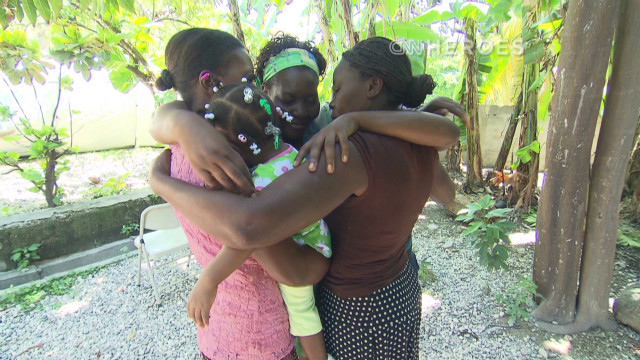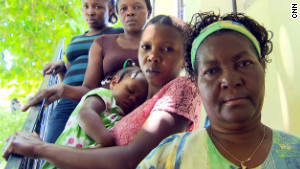CNN Heroes
April 26, 2012 -- Updated 2241 GMT (0641 HKT)

CNN Hero: Malya Villard-Appolon
STORY HIGHLIGHTS
- Rapes in Haiti increased after the January 2010 earthquake, experts say
- CNN Hero Malya Villard-Appolon and her group are reaching out to help victims
- Villard-Appolon says rape is underreported in Haiti and rarely prosecuted
- Do you know a hero? Nominations are open for 2012 CNN Heroes
But her nightmare was just beginning.
"I was gang-raped while I was sleeping in the middle of the street," she said. "And I got pregnant."
Alvana did not know her
attackers. Depressed and unsure of what to do next, she was directed by a
friend to a clinic run by KOFAVIV, a Creole acronym that translates
into the Commission of Women Victims for Victims.
"By the time I got to them, my belly was already big," she said. "But they took care of me."
Alvana was given food,
water, housing and prenatal care. She decided to keep her daughter, even
though the psychological pain could be difficult -- and still is, two
years later.
"It's terrible," said
Alvana, 33. "I love my daughter ... (but) I look at myself and see that I
have a child that is a product of a gang rape."

Malya Villard-Appolon, right, knows what it's like to be a victim of sexual violence. She has been raped twice.
Her story is, unfortunately, all too common in Haiti, said Malya Villard-Appolon, one of KOFAVIV's co-founders.
"After (the earthquake),
the situation was inhumane and degrading," Villard-Appolon said. "There
was no security in the (displacement) camps. There was no food; there
was no work. And now there is a rampant problem."
Accurate numbers are difficult, if not impossible, to find in the aftermath of such devastation, but KOFAVIV and other groups say they have seen a definite increase in rape cases after the January 2010 earthquake.
"Victims became more
vulnerable due to a range of things," said Brian Concannon Jr., director
of the Institute for Justice & Democracy in Haiti. "They lost their
houses; there were no locked doors anymore. People lost family members
who were a source of protection."
Terrible living
conditions, including a shortage of food and water, contribute to the
problem as well, said Charity Tooze, a senior communications officer
with the United Nations High Commissioner for Refugees' Washington
office.

Culture of rape in Haiti
"The conditions are so
dehumanizing," Tooze said. "Over months and months, it increases all
forms of violence, including sexual violence."
There has also been a
lack of prosecution in the country. In the first two years after the
quake, not one person in Haiti has been convicted of rape, according to
the UNHCR.
"The big problem is, you can't find justice," said Villard-Appolon, 52.
Even before the quake,
she says, rape was an issue in Haiti, historically underreported because
of social stigma, retaliation from perpetrators and a lack of legal
support. That is what led her and Marie Eramithe Delva to start KOFAVIV
in 2004. Since the group's inception, it has helped more than 4,000 rape
survivors find safety, psychological support and/or legal aid.
"We tell people to come out of silence," she said. "Do not be afraid to say that you have been victimized."
Villard-Appolon knows
what it's like to be a victim of sexual violence. She has been raped
twice, and her husband died as a result of beatings he endured trying to
save her from being raped. In 2010, her 14-year-old daughter was raped
in a displacement camp.
"I can't describe to you
how I felt when I heard about that, because I was a victim," she said.
"I started asking myself what kind of generation I came from. Am I
cursed?"
She escorted her
daughter to two police stations and received no assistance, she said,
just a lot of talk. One police officer told her that "girls are so
promiscuous" and indicated that many young girls are asking for sex.
But she carries on,
"fighting with hope that I know there will be a change," she said.
Internationally, she has testified before the United Nations Human
Rights Council, calling for increased security within the displacement
camps and asking that women's groups be included in decision-making
processes.
"I was a victim, and I did not find justice. But know I will get it for other women," she told CNN.
When the earthquake hit Haiti, KOFAVIV's founders watched their clinic and their offices collapse along with their homes.
Villard-Appolon lived in
the dangerous Champ de Mars displacement camp for half a year. There,
she said, she watched as conditions deteriorated.
"It was all kinds of
people who ended up in one area," she said. "The jails were not
destroyed, but their doors were opened, and all prisoners went free.
Many of them ... were armed, and they were notorious murderers."
One criminal held
Villard-Appolon at gunpoint, demanding money. The police never showed
up, she said, but she managed to escape after a group of supporters
arrived to fight.
Villard-Appolon said
many single women had to leave their children with strangers in order to
search for food, water or work. In some cases, the children were raped.
The youngest victim, she says, was a 17-month-old.
"I spent six months
witnessing it," she said. "Babies are not spared; adults are not spared;
mothers are not spared; sisters are not spared."
Despite the escalating
violence and the loss of its clinic, KOFAVIV regrouped to help victims
in Haiti's "tent city" camps, where about 500,000 people still live
today. The group has 66 female outreach agents and 25 male security
guards who work within the camps, organizing nighttime community watch
groups and providing whistles and flashlights to women. All of them have
been affected by gender-based violence, whether personally or through a
family member or loved one, Villard-Appolon said.
KOFAVIV also relies on
more than 1,000 members to help share their stories, support the victims
and urge them to come forward and fight for justice.
It usually starts by
accompanying the victims to the hospital within 72 hours of being raped.
Once they undergo a test, they receive the medical certificate they
must have to begin legal proceedings.
"After that, we assign a
lawyer to her," Villard-Appolon said. There is no cost to the victims,
and they receive support from KOFAVIV through the trial.
Villard-Appolon says she is determined to keep fighting for a brighter future, even though justice has been elusive.
"My dream is that we
will get to a place where we stop talking about the number of rape
cases," she said. "We will stop talking about Haiti as a country where
people are committing violence against others. One day, we have to be
able to say that we have a country with people who respect each other."
Want to get involved? Check out www.madre.org/kofaviv and see how to help.


No comments:
Post a Comment